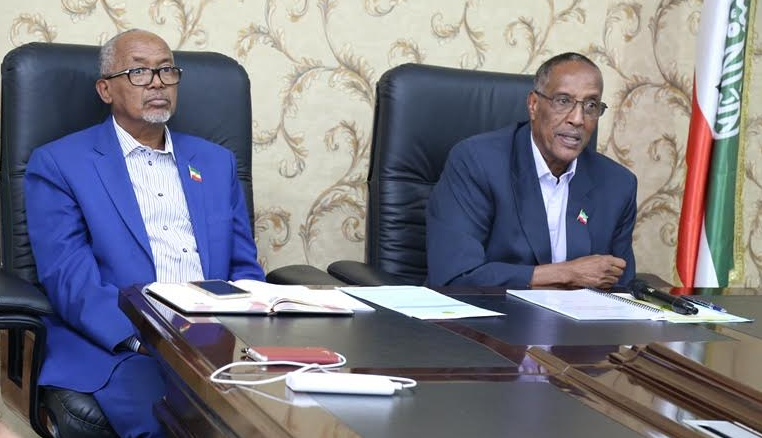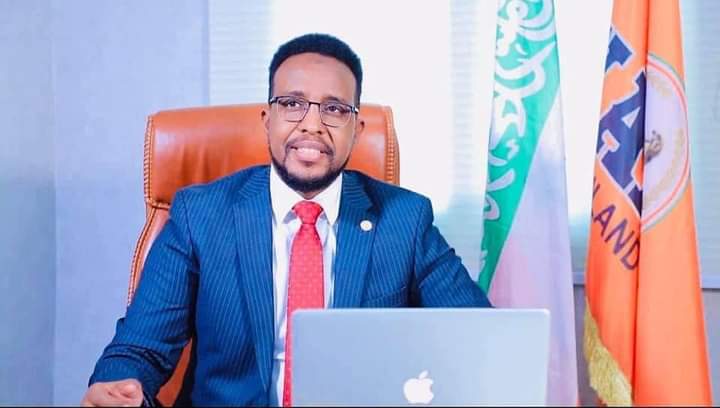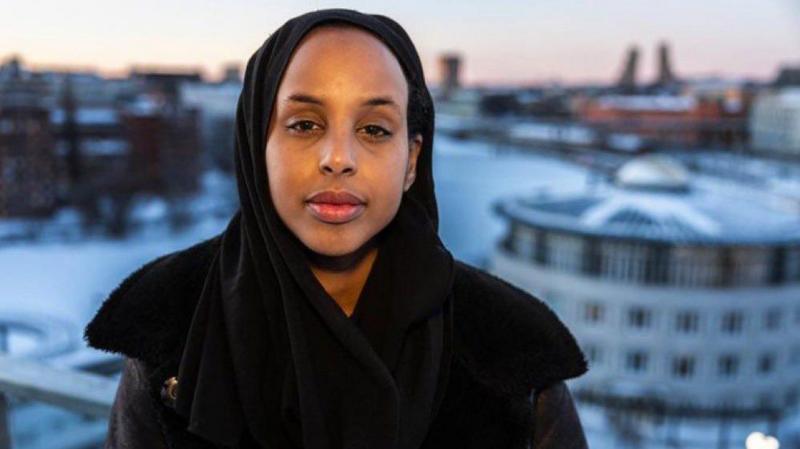The Tab Monday July 2, 2018
‘Everyone’s in suits and briefcases, I’m just rocking up to work in shorts and a snapback’
Doc Martens, 28 years old, refugee, Somali, black, Muslim and a cool
beard: these are not the facets usually associated with our political
system. But, last month, something rather strange happened.
The charismatic Magid Magid became Sheffield’s newest Lord Mayor. His
hip inauguration photo has gone viral online and every major media
organisation has been after him.
Many know him as Lord Magid or Magic Magid, but I know him as "man
like Magid, jheeeeeez". Magid and I are old uni friends, our telephone
conversation begins with a mix of Patwah slang, Arabic phrases and
standard English: "Salum Wa Alaykum Mo, long time, how's it going bro?"
I've prepared questions for this interview, but, before I can ask
them, Magid tells me about the problems he's been having with
journalists. One made him out to be arrogant, but throughout the
interview he says she was "so nice, she came across as lovely and
genuine." I laugh and warn him some journalists can be slimy.
Magid quickly makes our conversation positive again and stresses he's
resisted the temptation to tweet this journalist out: "I'm not a
negative person, I don’t like to bring negative vibes. I've being
getting so much racist shit, but I just focus on the positive. I'm just
gonna ignore it. Lesson learned."
Suddenly I realize I haven't even congratulated my friend on becoming
the Lord Mayor of Sheffield: "Well done, mashallah, it’s sick seeing
what you've done. You’ve smashed it wallah." He thanks me in Arabic and
English: "Jazākallāh , much appreciated bro".From Somalia to Sheffield
Ads By Google Copying facts about Magid's biography from other articles would be
lazy journalism, I tell him. He laughs and starts telling me an
interesting biography, much of it even new to me.
Magid tells me he was born in Somalia and came to Sheffield aged
five. He left a war-torn country for a rough Sheffield neighbourhood:
''I live in the hood, grew up in the ends, a social housing estate.
Wensley estate."
I went to school with boys from London's hoods, so know about
London's 'ends'. But I wonder what Sheffield's ghettos are like, so I
ask Magid about this estate. He says: "There is gun violence, crime, all
of that, like you'd have in any other socially deprived community in
England." He adds that a lot of his childhood friends got up to no good.
"Some are in prison, some of them are not alive anymore. It's just how
it was."
Grades wise, Magid did well, but not enough to please his mum. "I got
good GCSEs but my mum was never happy. Unless your getting straight As,
ethnic parents are never really happy."
He eventually went to the University of Hull to study Aquatic
Zoology, with a desire to immerse himself into university life. But this
immersion was not stereotypical, he explains. Whilst other male uni
students pursued girls in clubs, he went out "just to have a good time".
"When people see you're having a good time, they wanna be around that
good vibes. When you give out good energy, people wanna be around that
good energy, that’s how I used to attract people."
"That’s what I still do today, as a councillor, everyone's in suits
and briefcases, I'm just rocking up to work in shorts and a snapback, I
don’t give a shit. I think that attitude of staying true to myself, not
caring about what people think, has garnered me a lot of support and
fans."
During university Magid created an MMA society, which led to him to
run for Students' Union Presidency after being pleaded to do so. He won
the presidency, but Magid humbly explains to me this was down to his
clever use of social media, something "nobody was using at the time." He
continued being clever with social media after uni; he ran a digital
marketing business with two friends. He later left this to join a
housing charity in Sheffield.
UKIP and anti-migration rhetoric were growing at the time, inspiring
Magid to get involved in politics. Through YouTube videos and the BBC's
Daily Politics, he taught himself politics. He joined the Green Party
for their honesty and "bottom-up approach to politics versus a top down
approach".
Facts wise, Magid's told me everything preceding becoming Lord Mayor.
With my prepared questions ready, I tell him our 'interview' can now
officially begin.How Magid became mayor
The first thing I ask is fundamental: "How did you become Lord Mayor?"
Magid answers slowly and humbly, ''I achieved this through so many
other people, this is as much of a success about so many other people,
as it is about me, whether that be my mother who made so many
sacrifices, or my friends who gave me a lot of skills, or my teachers.
"It would be a lie if I said I got this through hard work. Hard work
is not everything, if hard work was everything, every fucking woman in
Africa who works hard would amount to amazing things. You need
opportunity, you need good people around you''. I could hear the passion
in his voice.
I next ask Magid for a summary of his politics. After about a minute spent mulling over his answer, he says:
"Standing up for social justice and equality. More importantly, just
trying to re-distribute the wealth between the rich and the poor.
Keeping the NHS free, free education, re-nationalising the railways,
getting rid of Trident, and more importantly, treating people as human
beings not as numbers."
Silence floats back again, Magid then passionately adds he wants to
"highlight the fact that asylum seekers, refugees and immigrants enrich
our lives. Immigrants make Britain great, and I think our difference is
what makes us unique and amazing."
After answering Magid asks, anxiously, if that was eloquent enough.
"If you can put that in a nice eloquent way, that’s pretty much what I’m
trying to say". I tell Magid his words were eloquent, and in secret I'm
smiling and nodding to his words.
'I want the country to be talking about Sheffield'
''What do you plan to do with your power?'' is my next question.
He tells me he has two main focuses. The first is young people; he'll
support local initiatives run for young people and empower young people
to participate in their community. "You don’t have to be a politician,
you don’t have to be an MP, you don’t have to be a councillor, or a Lord
Mayor, to make a real positive contribution to your community."
His second focus is culture. "Sheffield has amazing culture, sports,
music and arts. I want to be able to champion that, so I’m going to be
creating Poet Laureate for Sheffield. I want to put Sheffield on the
map, I want everyone around the country to be talking about Sheffield."
My next question is my most difficult: "What do you plan to do about
Sheffield’s plight of homeless people?" He sighs and admits that’s a
tough question; I admit it’s a question my editor gave me.
Magid tells me he will support Sheffield's local charities: "My whole
point is to make sure they’re fully supported to do their job." He adds
that homelessness is very complicated and he’s no expert on it, so the
best thing he can do is "support the amazing charities that actually do
the great work."
'I was like rah, this picture needs to be the baddest picture I can think of' The previous question was particular to Sheffield, but my next
question is something everyone in the country wants answered. Magid's inauguration photograph
was a piece of historical art. I ask him for 'the story behind that
picture.' He tells me he was inspired after seeing ex-Lord Mayors'
pictures. "I was like rah, this picture needs to be the baddest picture I
can think of."
To achieve this, Magid searched for a photographer reflecting his politics. He found a guy called Chris Saunders.
Magid instructed Chris to create a picture which "had a bit of that
tradition" but also a message of "wanting to do things differently." If
you’ve seen the picture, you’ll understand this.
After Chris had taken a few standard pictures, and when security were
not watching Magid, he had a eureka moment. "I thought to myself, rah,
I’m gonna do like, you know Nas’s StiIllmatic front cover? It’s
basically him doing a similar squat, that’s an album I was listening to
that day. So I kinda just went into a straight squat, I fell so
comfortably into it, and took that picture before security came, because
it was a massive health safety and hazard. There's a massive drop."
Traditionally, Lord Mayor pictures are done by a photographer the
council uses each year. So Magid’s photographic stunt caused a backlash:
"I was kind of breaking the rules and not conforming." Hearing this is
hilarious and reveals Magid’s fun side, something I promised Magid I
would convey in the interview.
Bringing gun fingers to local government
"As one ethnic minority to another, what’s your favourite Grime dance
move?" I ask, "bro, it has to be-" I interrupt: "The gun finger?"
"It has to be the gun finger, but not any gun finger, because you see
some people with sloppy gun fingers, kinda bent gun fingers. They need
to be solid stiff gun fingers."
I tell Magid those words are newsworthy, and ask if these dance moves
will be deployed in Sheffield Council’s Christmas party. Magid tells me
there's no Council Christmas party, but tells me a secret.
"I’m gonna get local grime artists to come and perform at the full
council meeting in the chamber. It will look mad because everybody's
gonna be in suits, and there’s gonna be old people, with grime artists,
it’s gonna be hilarious bro."
Using grime in politics is a smart idea. I compliment it, which
quickly sinks into a tangent talk about grime. Not anyone can be an
effective grime MC, I tell Magid. "You need to have the theatrics: the
right voice, charisma and good camera presence." I admit to Magid I’m
more talented behind the camera than on it, whereas he has a clear
camera charisma.
When I stop my Theatre Studies analysis of grime, Magid preaches
fatherly to me: "You know Mo, those roles are easily reversed. Legit.
Louis Theroux is weird, at the start of his career he must have had so
many setbacks, but look where he is now. There’s always an audience,
you're not gonna be everyone’s cup of tea. And you know what with me
bro, in my role as Lord Mayor, there’s bare people that hate me, but you
know what, I can’t please everybody. So I'm staying true to myself."
His words sink into me, and a short silence arises. "But anyways let’s continue this interview," he says.'My DMs are looking healthy'
I then ask him my cheekiest question on the list. "What are the chicks saying, now that your Lord Mayor?"
"You know what it is Mo, my DMs are looking healthy." I immediately
laugh and shout, "Yo, did you prepare that line?" Magid says: "Nah, nah,
nah, they're popping, real healthy at the moment!’
'You can't expect the Arctic Monkeys to still be talking about going on a night out in Sheffield'
"Arctic Monkey's new album, masterpiece or rubbish?" Magid tells me
it’s neither, defending Arctic Monkeys from the standard hipster
criticism musicians receive for changing.
"You can’t expect them at their age to be talking about going on a
night out in Sheffield and getting pissed, people change. I expected
them to be different. Sometimes people don’t like different, that’s why
people are slagging them off. I admire the courage they’ve taken to be
this different, but it's not my cup of tea."
'Be yourself'
As cheeky as my cheeky questions are, I don’t have a lot, so I
quickly create a final question. Hesitantly, I ask Magid – because I’m
not even confident about the value of this question –"What’s the secret to getting a girl to like you?"
Magid quickly fires back: "I'm trying to think of an interesting
answer, because the cliché is, be yourself." These words resonate with
me, so I interrupt Magid to argue his answer is interesting. I point out
how his message of 'being yourself and giving off good vibes' has
echoed throughout our interview.
Magid then softly tells me, "Legit, wallah, that was my technique."
He recalls how, in university, he saw guys upset after a failed night of
'pulling'.
"You're already setting yourself up to fail, so I used to go out and
first of all think about myself, have an amazing time. I used to dance a
lot, I’d have a great time, and girls and guys, they liked the positive
energy, and they’d come and dance with me."
My questions are now finished, so I stop being a journalist, and chat
to Magid as a friend. I suggest a few grime acts he should use for his
event. Quite quickly though, I sense he has to shoot off.
Our time has ended. I tell him he's welcome to hit me up in London,
he says I'm welcome in Sheffield. We say goodbye in a mixture of slang,
Arabic and standard English: "Safe for this interview", "no worries
bro.""Alekum Salum.""Happy Ramadan, and well done again."
After the phone call ends, I look at the duration of my call, just
under two hours. The time's around 9pm. "My evening's fucking finished",
I think, but there's a smile on my face.
The secret beneath Magic Magid's magic was not that much of a secret.
"Be yourself", "'stay true to yourself'", "our difference makes us
unique and amazing."
advertisements
- Seven injured by road-side bomb in Somalia's Mogadishu - Reuters
- Halima Aden announced as UNICEF Ambassador - PRNW
- For refugees in Germany, football Is about bonding and a future -
- Denmark’s crackdown against Muslims will separate toddlers from moms - Carbonated TV
- From herding camels to digging graves – demise of a proud Somali pastoralist - Radio Ergo
- Watch Halima Aden Return to Kakuma Refugee Camp in Kenya for the First Time - Teen Vogue
- Stabbings at kid’s party echo violence refugee families fled - AP
- Dar, like Nairobi, chokes in traffic! - Citizen
- 10 Somali students arrested in Turkey - MEM
- Somalia condemns mortar attack that left 5 dead in Mogadishu - Xinhua
- Brazil vs Mexico player ratings: Neymar and Philippe Coutinho impress en route to World Cup 2018 quarter-finals - Independent
- Absent parents could have their passports confiscated - Daily Mail
- 10 Somali students arrested in Turkey - MEMO
- Somalia condemns mortar attack that left 5 dead in Mogadishu - Xinhua
- Sophia the robot meets Ethiopian PM - BBC
- Somaliland ambassador in Uganda calls for unity as they fight for recognition - The Observer
- Behind the secret U.S. war in Africa - Politico
- Leftist Wins Mexico Presidency in Landslide With Mandate to Reshape Nation - New YorK Times
- Rift Valley Fever cases hit 80 in Wajir - Daily Nation
- For these 3 women, it's not just Canada Day today - CBC
- Kenya launches global manhunt for 3 suspected drug barons - Xinhua
- Somalia connection in sugar smuggling syndicate revealed - Daily Nation
- Joint trainings key to end violent extremism globally – Uganda Deputy CDF - New Vision
- Qatar Charity launches dispensary in Mogadishu - Gulf Times









